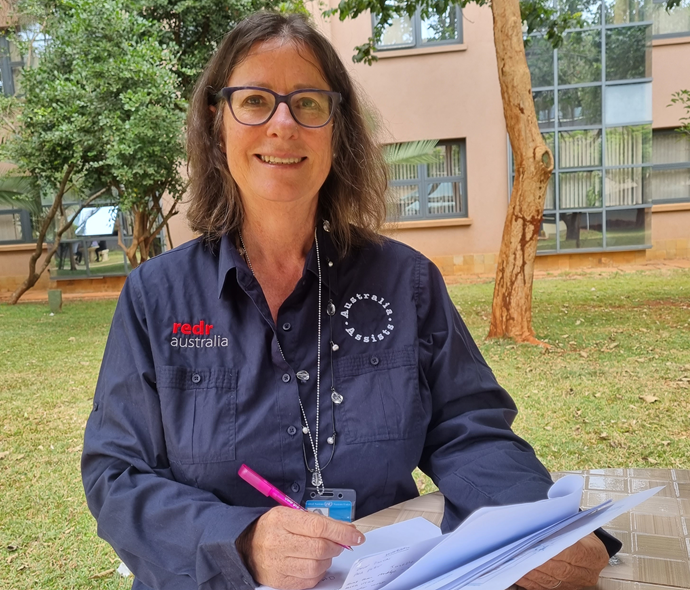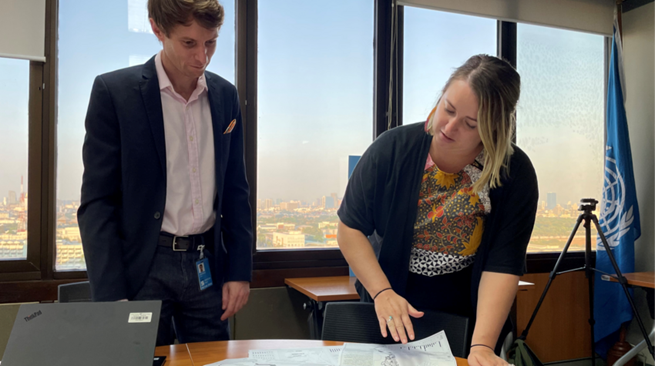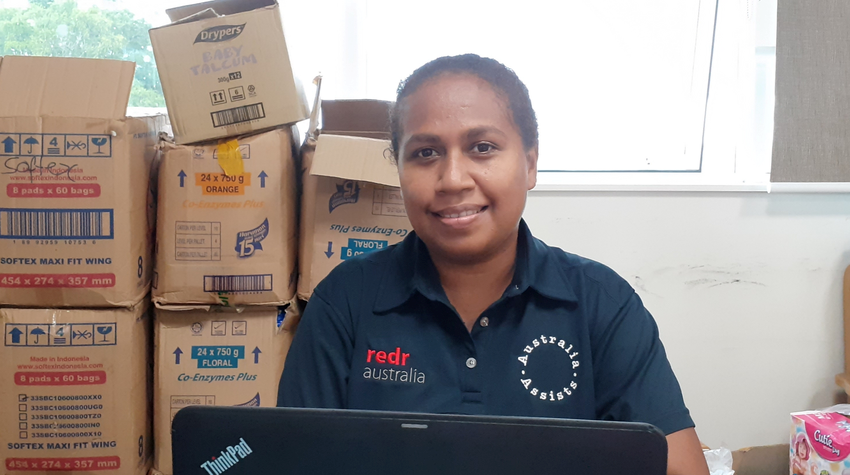Through Australia Assists, women are advancing gender equality within partner organisations and communities around the world.
For Solomon Islands national Everlyn, supporting women and girls in her own country is both “a privilege and a responsibility”.
Working with UN Women in the role of National Gender and Resilience Officer, the Honiara-based deployee is helping to build women’s resilience to natural hazards – so that when disaster strikes, their livelihoods and families are equipped and can build back stronger.
Everlyn’s deployment through Australia Assists, the Australian Government’s humanitarian civilian deployment program implemented by RedR Australia, places the needs, circumstances and experiences of Solomon Islands women – who are disproportionality impacted by floods, tropical cyclones and drought – at its core.
“If we don’t empower women and consider their unique capacity, we cannot achieve resilience as a community,” Everlyn explained.
Having commenced her deployment in the new year following earlier work with UN Women, Everlyn’s role is focused on developing resilience tools, policies and guidelines that consider the roles women predominately play in their families and communities – including as caregivers and farmers – as well as the valuable local knowledge they hold.
Everlyn is also strengthening the skills of national disaster risk reduction and climate change practitioners so that the protection of women and girls is considered across all facets of disaster response.
“I feel excited to be an example of and for women of my country. I want to influence more women and girls in taking the lead,” Everlyn said.
Everlyn’s work is one example of the impact of Australia Assists – with a number of female deployees working both to build a sustainable future through their individual deployments and to empower other women and girls to contribute to change within their communities.
UN Women figures estimate nearly 60 per cent of women around the world work in the informal economy, earning and saving less, and therefore being at greater risk of falling into poverty.
Women and girls also face greater vulnerability and exposure to humanitarian crises like natural hazards and conflict, with climate-related disasters shown to increase gender-based violence including sexual harassment and violence, domestic violence, child marriage, sexual exploitation of children and human trafficking. Women and girls are also 14 times more likely than men to die or be injured from a natural hazard.
Despite this, they remain largely ignored in developing solutions to the challenges facing their communities and their capabilities are often under-utilised.
International Women’s Day, Tuesday 8 March 2022, celebrates the contribution of women and girls around the world who are working to change the climate of gender equality and build a sustainable future – for themselves, their families, their communities and their countries.
Advancing gender equality in the context of increasing natural hazards is one of the greatest global challenges of the 21st century. Harnessing the skills and knowledge of women to contribute to – and lead – disaster risk reduction efforts and create a healthier, more sustainable planet, is central to achieving the 2030 Sustainable Development Goals.
In Kenya, Australia Assists deployee Victoria is working with the United Nations Office for the Coordination of Humanitarian Affairs (OCHA) to bolster policies and programming that address sexual exploitation and abuse right across Southern and East Africa.
Based in Nairobi since December 2021, the Protection from Sexual Exploitation and Abuse (PSEA) Coordinator is leading efforts to address the issue using a survivor-centred approach – working with country teams, working groups and networks to map PSEA activities already underway, identify further opportunities and advocate for the implementation of best practice PSEA efforts.
With her role covering up to 19 countries on the continent, many of which are experiencing ongoing humanitarian crises, Victoria’s role is critical to ensuring the safety of women and girls is addressed before, during and after disasters.

Australia Assists deployee Victoria is working across Southern and East Africa to protect women and girls from sexual exploitation and abuse.
The Australian Government is committed to advancing gender equality and the rights of women and girls at home, in our region and through broader international engagement, with the Gender Equality and Women's Empowerment Strategy guiding this work across aid, foreign policy and other sectors.
Gender equality is also a priority for Australia Assists, with the program’s Gender Equality Strategy and Action Plan including measures to enhance women’s voices in decision-making, leadership and peace building and end violence against women and girls.
Since 2017, Australia Assists has deployed a number of women who have driven gender and protection efforts within their host organisations – including 10 deployees in specialised gender-focused roles and a further 15 in protection roles. These women have contributed a total of 177 months of targeted support to empower women and end gender-based violence across 10 countries – equivalent to nearly 15 years support in just over four years. A further seven women have deployed to gender-mandated host organisations including UN Women and United Nations Population Fund, helping to deliver programs, policies and standards that uphold the rights of women and girls.
Recognising that accelerating gender equality is everyone’s responsibility – not just that of dedicated gender experts – 68 per cent of deployees in FY21 to date have reported contributions towards gender equality in their end of deployment reporting. Such gender mainstreaming can take place through activities such as policy or legislation development, resource allocation and advocacy.
In Bangkok, deployee Annie is collaborating with a number of gender specialists in her work building the capacity of humanitarian actors in Myanmar to listen to and action the needs of affected communities.
The Accountability to Affected Populations (AAP) and Community Engagement Specialist has been on deployment with OCHA since March 2021, and is currently supporting the Gender in Humanitarian Action Workstream and PSEA Network in Myanmar to roll out interagency AAP and PSEA training in Myanmar language across the country.

Australia Assists deployees Jason and Annie are supporting the Rohingya response from OCHA's Regional Office for Asia Pacific in Bangkok.
When gender is considered across all realms of humanitarian practice, it not only helps women and girls to reach their full potential – it improves response efforts by contributing to stability, peace and economic development, which further benefit women and girls.
Through the efforts of expert female deployees like Everlyn, Victoria and Annie, women and girls can look forward to a world that upholds their rights and listens to the voices. Australia Assists is proud to have these experts as part of the program and to contribute to lasting change for women and girls worldwide.


